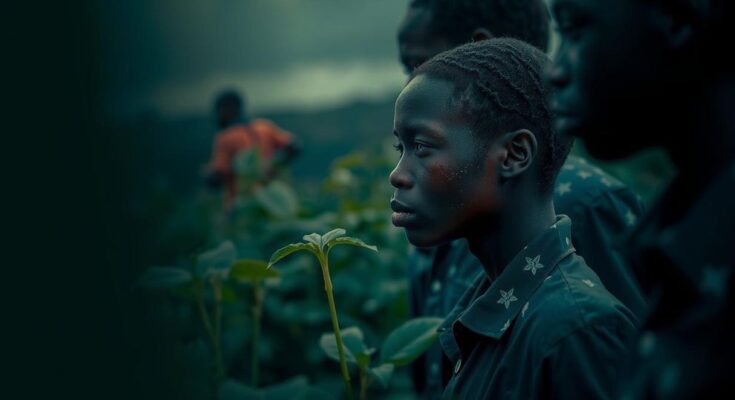The ongoing conflict in eastern Congo has triggered a severe mental health crisis, with a notable rise in individuals seeking psychological support in the face of escalating violence. The impact of displacement and trauma has compelled many, including vulnerable children and survivors of sexual violence, to confront profound emotional distress. Despite concerted efforts by aid organizations, a significant funding shortfall hampers the provision of necessary mental health services in this dire situation.
The long-standing conflict in eastern Congo has precipitated a significant mental health crisis, exacerbated by the rampant violence and instability in the region. Reports indicate that an alarming increase in individuals seeking mental health support has occurred amid escalating hostilities. Nelly Shukuru, a 51-year-old woman displaced in the Lushagala camp near Goma, provides a harrowing example of these struggles. Faced with overwhelming despair and contemplating suicide due to her dire circumstances, she was fortunately dissuaded by a neighbor. Like many in her community, Shukuru feels that the suffering brought on by the conflict appears perpetual. Undoubtedly, the war has inflicted deep psychological scars on the population, with aid organizations observing a more than 200% rise in those seeking psychosocial support from January to June, jumping from 6,600 to over 20,000. The number of individuals expressing suicidal ideation has escalated dramatically—from around five per month at the year’s commencement to more than 120. With upwards of 100 armed groups contesting control over the mineral-rich eastern territories, the violence has intensified, particularly as M23 rebel forces, purportedly supported by Rwanda, reemerge. This has resulted in the displacement of millions, with over 600,000 individuals seeking refuge in camps surrounding Goma. The psychological toll manifests in increased rates of anxiety, depression, post-traumatic stress disorder, and other stress-related conditions among the residents. Innocent Ntamuheza, a psychologist with Action Against Hunger, commented, “All around us there is war, and the number of people facing difficulty is increasing daily.” Despite the widespread need for mental health services, only a small fraction of the necessary funding has been allocated to these initiatives, with the United Nations indicating that under 30% of the $180 million requested for protection, including mental health support, has been received in 2024. Tragically, many survivors of sexual violence face additional layers of trauma, compounding their mental health concerns. Reports detail an unprecedented number of sexual violence survivors, with over 25,000 individuals treated by Médecins Sans Frontières (Doctors Without Borders) last year alone. Conditions in the camps, which offer little in terms of safety or mental well-being, are further exacerbated by the presence of armed groups, contributing to ongoing cycles of violence and trauma. Local initiatives, spearheaded by various organizations, seek to train community leaders to recognize signs of mental distress, yet the prevailing stigma surrounding mental health remains a formidable barrier to accessing help. Nonetheless, those who receive treatment report beneficial coping strategies that enhance their resilience. Children and families affected by the conflict are also targeted for specialized interventions, with organizations such as War Child employing creative methods to assist youth in expressing their trauma and emotions. Despite the dire circumstances, there are efforts underway to improve the mental health landscape for those suffering from the ravages of war in Congo.
The persistent conflict in eastern Congo has created a landscape marked by instability and humanitarian crisis. As factions vie for power in a region rich in resources, millions have been displaced, leading to a surge in mental health challenges among the affected populations. The lack of adequate mental health services exacerbates these struggles, with many individuals experiencing profound psychological distress amidst ongoing violence. Consequently, aid organizations are working diligently to address this urgent mental health crisis, navigating funding deficits and the complexities of stigma surrounding mental health in these communities.
In conclusion, the mental health crisis resulting from years of conflict in eastern Congo is of grave concern, marked by increasing numbers of individuals seeking desperate help amidst a backdrop of violence and instability. While aid organizations endeavor to provide support, they face substantial challenges, including severe underfunding and the stigma that often surrounds mental health issues. By enhancing community awareness and developing targeted interventions, there is hope for alleviating the psychological burden borne by many, though significant efforts and resources are desperately needed.
Original Source: apnews.com




